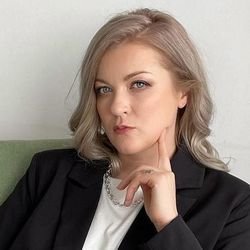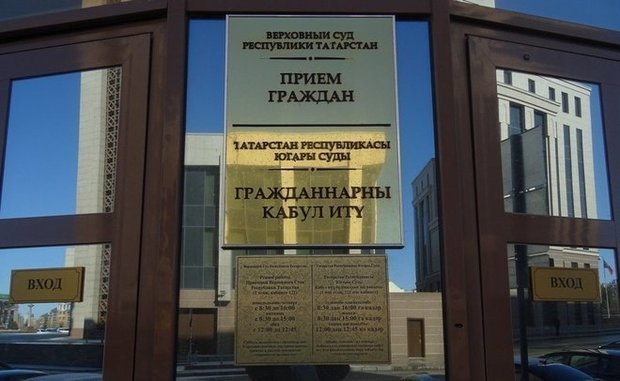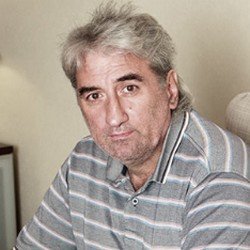'Any vaccination must be voluntary': QR code opponents reach the court
Number of plaintiffs decreased by four times during the process
The Supreme Court of Tatarstan has begun considering the case on the applications of citizens demanding the cancellation of the QR-code system, indicating the presence of vaccination against coronavirus or earlier desease. The lawsuits, combined into one production, were filed by 39 people, residents of different cities of Tatarstan. During the process, they changed their claims. Journalists were not allowed into the hall, referring to a lack of seats. Realnoe Vremya has built up the picture of the events. Read the details in the report from the field.
Both collectively and personally
The lawsuit for the cancellation of the QR-code system or, if officially, the Resolution of the Cabinet of Ministers of the Republic of Tatarstan No. 960 dated October 7, 2021 “On Amendments to the Resolution of the Cabinet of Ministers of the Republic of Tatarstan dated March 19, 2020 (208) 'On measures to prevent the spread of the new coronavirus infection in the Republic of Tatarstan” was filed by 39 people — in groups and individually. Among them, there were both representatives and supporters of Yabloko and Left Front parties, as well as individual citizens. Not all of them are ardent anti-vaccinators, someone has already been vaccinated, someone can not do it for medical reasons.
As the attorney of one of the plaintiffs, Lavrenty Sichinava, told Realnoe Vremya, the text of the statement of claim was handed over to activists living in other cities of Tatarstan, who prepared their legal statements on its basis. All of them were considered by one of the most experienced and moderate judges, Deputy Chairman of the Supreme Court of the Republic of Tatarstan Eduard Kaminsky. It should be noted that since the resolution of the supreme executive authority of the republic is being disputed, the Supreme Court of the Republic of Tatarstan is the court of first instance for such process.
The plaintiffs from Yabloko party, who appeared in full force, gave interviews to journalists and bloggers before the session. The head of the Green Russia faction of Yabloko party, Yelena Izotova, told our publication that she herself had been vaccinated but did not agree with the actions of the authorities.

“We could not have foreseen that there would be so many of you”
No more than a dozen of the 39 people attended the court session, the rest, apparently, residents of other cities, did not come to Kazan. Two more plaintiffs were late for the process, and they were not allowed into the hall. After the identities of those present were established, judge Eduard Kaminsky asked the journalists to leave the premises, justifying this by the impossibility of ensuring social distance. A small hall was allocated for the consideration of the high-profile case, and people were sitting right next to each other.
“We could not have foreseen that there would be so many of you," the judge stated.
The request to change the room to a more spacious one did not work, as did the arguments that journalists were fulfilling their professional duty. The representatives of the mass media were waiting in the corridor for the end of the process, which lasted more than two hours. We learned about everything that happened behind closed doors later, from the participants of the court session themselves.
One of the claimants who were late and not allowed into the hall, who filed an individual complaint against the Cabinet of Ministers of the Republic of Tatarstan, Niyaz Gubaydullin, told the correspondent of Realnoe Vremya that he was a surgeon by profession, who also received a legal education.
“Due to that there is no reliable information about COVID-19 in our country in the media, the population is being misled. As a doctor, I understand this issue. The resolution No. 960 is aimed at preventing the spread of coronavirus infection. That is, according to this regulatory act, they create voluntary and compulsory conditions for vaccination. Meanwhile, scientific studies published, in particular, in the Lancet journal have established that vaccination itself does not in any way affect the spread of coronavirus infection, because both vaccinated and unvaccinated people spread the virus equally. At the same time, I would like to draw the court's attention to the fact that my constitutional rights are being grossly infringed. I have had coronavirus, if I want to get vaccinated— I will not be able to do it like others, because I have contraindications for vaccination. Thus, it turns out that in our country people are divided into two varieties — vaccinated and unvaccinated, having a QR code and not having ones. But this is open discrimination against Russian citizens, contrary to the norms of the Constitution.”

Gubaydullin noted that the only legitimate opportunity to protest is to go to court with a claim for infringement of citizens' rights. Which he did.
“I would like to draw attention to the fact that in accordance with the Article 120 of the Constitution of the Russian Federation, the judge who is considering the case is obliged to apply the spirit and direct meaning of the Constitution when considering any court case and evaluate any regulatory legal act," concluded the plaintiff.
The court refused the request to invite Patyashina
Lavrenty Sichinava said that he applied for the invitation to the process of the head of Rospotrebnadzor for the Republic of Tatarstan, Marina Patyashina. But the court refused this.
“There are two representatives of Rospotrebnadzor present in court. But they are lawyers by training. But the thing is that the issues expressed in the contested resolution are directly connected with medical issues. In particular, about, let's call a spade a spade, compulsory vaccination. Her representatives can answer questions that relate to legal aspects, but I wanted to personally ask Patyashina questions that are related to medicine. Lawyers will not be able to answer these questions. But I was refused by the court for the reason that here we are talking about the compliance of this regulatory legal act with a regulatory legal act that has great legal force. Therefore, Patyashina's explanations, according to the court, have nothing to do with the claims.”
However, the lawyer does not lose hope to return to this issue, according to the law, the same petition can be applied for again. He said that before preparing the claim, he had personally applied to Rospotrebnadzor with a request for clarification on the introduction of a QR code system. And he received an answer that the questions concerning jurisprudence had been sent to the Ministry of Justice, and he would receive additional answers to the rest of the questions, but he never received them.
“No resolution — no claim”
As Sichinava's lawyer told at the end of the session, the judge first combined all the claims into one proceeding, which is allowed by law. Then more than two dozen citizens who failed to appear lost the status of plaintiffs. Here it is necessary to make an explanation. At the moment, Resolution No. 960 of October 7, 2021 has lost its legal force due to the fact that a new almost identical resolution of the Government of the Republic No. 1006 of October 28, 2021 was adopted. The plaintiffs disputed the previous regulatory act. Therefore, those present at the session have changed the subject of the claim and are disputing the most recent document.
“Most likely, this was done so that we did not prepare and in the first session faced the fact that, as Sichinava said: if there is no resolution— there is no lawsuit. But we have prepared, and as you can see, we managed to continue the court session," plaintiff Yevgeny Khabibullin believes.
Eduard Kaminsky granted the application. But those who did not reach the Supreme Court of the Republic of Tatarstan, respectively, could not join the application. Now they can participate in the process except as spectators.

Plaintiff Evgeny Khabibullin, whose interests are represented by Sichinava, is generally satisfied with the outcome of the meeting.
He himself noted that he had got the first component of the vaccine. But he worries about those who, because of poor health, are afraid to get vaccinated and therefore will be restricted in their rights.
“How will they go to work? Not everyone has cars. Officials are adopting a law that you can't get on a bus or subway without a QR code, but they don't use public transport. We strongly disagree with this and insist that any vaccination should be voluntary. Many doubt, do not get vaccinated. Last year, there was no such mass vaccination, and the incidence was lower, and now 50% have been vaccinated in Tatarstan, and the incidence is increasing. What is the reason for this? At first, they said that in order to develop collective immunity, 60% of citizens need to be vaccinated, then 80%, now 90%. The same Patyashina promised a month ago that there would be a collapse if QR codes were introduced on transport. What are we seeing? They are being introduced.”
Khabibullin emphasises that all those who have applied to the court are law-abiding respectable citizens who do not call for any illegal actions.
The next session, where the case will be considered on the merits, is scheduled for December 7. Realnoe Vremya will follow the developments.